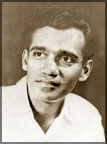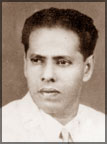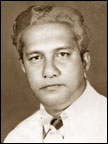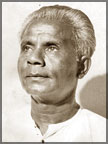Philip and NM combo - LSSP's Golden Era
by W.T.A. Leslie FERNANDO
The UNP which won 42 seats at the 1947 general elections became the
strongest political party in the House of Representatives. The LSSP got
10 seats the BLPI won 5 seats and the CP could win only 3 seats. The
Leftist altogether won 18 seats and became the leading group in the
Opposition.
The Leftist faced the 1947 elections in an unfavourable position. The
UNP promised to obtain full independence and the Leftists were unable to
offer an alternative to arouse public opinion in their favour.
 |
 |
 |
 |
 |
|
Basil
De Silva |
M.S.Abubaker |
C.A.Mathew |
W.M.Perera |
D.A.Piyadasa |
The failure of the 1947 general strike too went against them. In this
background winning 18 seats was an achievement.
According to Prof. Y. Rajith Amarasinghe this convinced some of the
Samasamajists that they were not outside the pale of electoral politics!
Although the UNP could win only 42 out of 95 seats in the House of
Representatives they were unable to form a government without the
support of some independents. In the meantime Philip Gunawardena tried
to form a government of progressives under S.W.R.D. Bandaranaike as
against that of D.S. Senanayake with the support of the Leftists, former
Sinhala Maha Sabha members and Independent socialists like H. Sri
Nissanka and Wilmot A. Perera.
The initial discussion for this purpose was held at "Yamuna" the
residence of H. Sri Nissanka. It failed because S.W.R.D. Bandaranaike
was not amenable to the proposal. Although at this time Philip was
Trotskyite, these overtures indicated that he was willing to discard one
of the pillars of Trotskyism - Opposition in principle to coalitions
with representatives of the burgeoise.
Sri Lanka got independence on February 4, 1948. This led to a
conflict of opinion between the LSSP and the BLPI. The LSSP conceded
that the independence though incomplete was an improvement on the
existing constitutional status. The BLPI condemned independence as an
outright fraud.
When the premier D.S. Senanayake moved a proposal expressing
jubilation on the granting of independence, Dr. N.M. Perera moved an
amendment on behalf of the LSSP, appreciating the grant of independence,
but regretting that it was incomplete because (A) It was negotiated by a
handful of leaders without any reference to people, (B) The signing of
three agreements was a prerequisite for granting of independence and,
(C) Non-existence of provisions for the Sri Lankan legislature to amend
the constitution and the retention of rights to legislate for Sri Lanka
by the Parliament of Westminster.
The BLPI called the new status as 'faked independence'. They
interpreted it as a measure consistent with the policy of the British
Labour Government for reconstruction imperialism. They held that the
only change effected was that from direct to indirect method of control.
They denounced independence as a means that would give ample
opportunities for the imperialists, economic and military exploitation
of Sri Lanka.
Although the LSSP stayed away from the ceremony to celebrate the
declaration of independence it attended the opening of the new
Parliament of the independent Sri Lanka. The BLPI, not only boycotted
all the ceremonies, but also organised a protest rally against what it
called 'faked independence'. The LSSP criticised the attitude of the
BLPI and advised that the revolutionary parties should lie low and watch
the situation rather than indulging in chief adventurism and snobbish
exhibitionism. The BLPI answered with counter accusations and
insinuations with equal venom.
In the meantime Philip Gunawardena was convicted and sentenced to
three months rigours imprisonment over an incident connected with the
South Western bus strike.
As a result he forfeited his seat in Parliament and his wife Kusuma
was returned uncontested for Avissawella. When Philip was released from
the prison, he organised the LSSP youth leagues all over the country. He
was elected unanimously as the first President of the LSSP youth
conference formed in 1949. The BLPI now began to move closer to the CP
than the LSSP. A move to appoint dr. N.M. Perera as the Leader of the
Opposition was not effected because it was thoroughly opposed by the
BLPI.
By this time the Bolshevic Lennist Party of India formed when the
LSSP leaders were hiding there, had become a weak organisation. The BLPI
was a combination of some groups in Bombay, Calcutta and Madras rather
than a political party. It was confined to some LSSPers who lived in
India and a few Trotskyites there.
In 1943, when Philip, NM, Robert and others were arrested in India
and brought back to Sri Lanka, the BLPI was continued by the
Colvin-Leslie faction who remained in India. In 1947 it got some
publicity because of a strike led by S.C. Anthony Pillai in Madras. When
Colvin-Leslie faction too returned to Sri Lanka, it was manned by a
handful of Trotskyites in India. In early 1949, the BLPI was dissolved
and its remnants joined the Socialist Party of India. Its Sri Lankan
section now assumed the name Bolshevic Samasamaja Party and were to
continue for some time longer.With the end of the Bolshevic Lennist
Party in India, the grounds were prepared for the unification of the
LSSP and BSP in Sri Lanka. As both the parties professed Trotskyism many
in both were keen to have a single party.
However the LSSP insisted that like the remnants of the BLPI joining
the Socialist Party in India after dissolution of their organisation,
the Bolshevics here too should join the LSSP in the same manner. It also
emphasised that the BSP should terminate its association with the CP.The
BSP though willing to join with much larger LSSP it was not prepared to
dissolve the party. The Bolshevics wanted a fusion on an equal basis and
wanted to ensure positions of power to their own leaders in a future
united party. These conflicts stood in the way of a unity.
However by the end of 1949, second rank leaders of the LSSP took an
initiative to forge a unity between the two parties. At the LSSP
conference held in January 1950, it was proposed that negotiations
should be resumed immediately and Philip and NM whose attitudes hindered
a unity should be kept out of talks. Although Philip and NM opposed the
resolution, it was adopted. Philip was replaced by T.B. Subasinghe as
the Secretary.
Soon the negotiations for the unity progressed rapidly and it was
finally resolved that the LSSP and the BSP should be merged to form a
new LSSP different from either of the two organisations. Philip was
critical of the unity arrangement.
His position was that it tantamounted to a dissolution of the LSSP
and playing into the hands of the BSP.
At the conference of the LSSP held on May 14, 1950 to review the
proposal of the unity, Philip alleged that the new set up was against
the preservation of the LSSP. When it was decided that the merger should
be implemented, Philip walked out of the conference with his 42
supporters.
The dissenters who followed Philip included two MP's Florence
Senanayake and Kusuma Gunawardena and some ardent members of the LSSP
like M.S. Abubaker, W.J. Perera (Hospital Perera), C.A. Matthew,
Santiago Fernando, Basil de Silva, C.A. Hikkaduwa, D.A. Piyadasa and W.M.
Perera. The majority of them were harbour workers, peasants and Swabasha
teachers. It was strange that Robert Gunawardena stayed in the party and
when Philip was leaving Robert has asked NM "Are you not going?"
The LSSP had its golden era when Philip and NM were together. The
role of the duo in the State Council was the main inspiration for the
LSSP to gain ground in Sri Lanka.
When Philip and NM came out of the jail the party was in the hands of
the Bolshevics. The duo was able to revive the LSSP in opposition to the
BLPI as a party with a mass support. When Philip and NM separated, the
LSSP could never regain its former glory.
|

